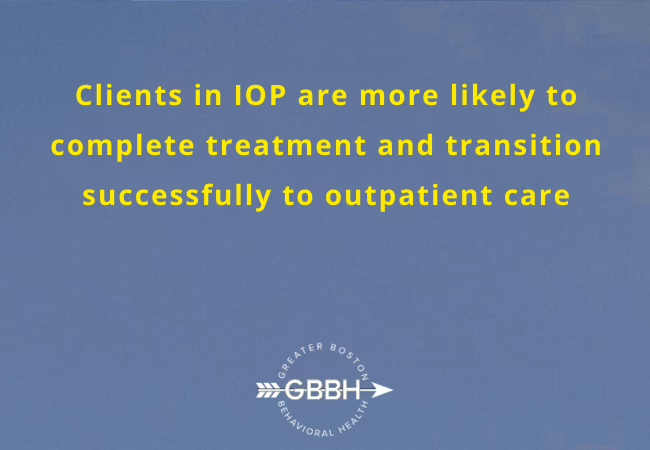At the heart of every lasting recovery is empowerment—the belief that you have the strength, tools, and self-awareness to reclaim your life. Whether you’re recovering from depression, anxiety, trauma, substance use, or emotional dysregulation, healing starts when you begin to trust your ability to take charge.
But empowerment isn’t built overnight. It’s cultivated through structure, skill-building, support, and gradual independence. That’s exactly what an Intensive Outpatient Program (IOP) provides.
At Greater Boston Behavioral Health, our Intensive Outpatient Program in Massachusetts offers a unique combination of clinical excellence and real-life application—designed to help you not just recover, but thrive.
What Is an IOP and How Does It Work?
An Intensive Outpatient Program is a structured level of care that helps people stabilize and grow after a partial hospitalization program in Massachusetts, or when weekly therapy alone isn’t enough. It provides a middle path between inpatient/residential care and outpatient therapy.
Key Features of IOP:
- 3–5 days per week, 3–4 hours each day
- Group therapy, individual counseling, and psychiatric care
- Coping skills development, psychoeducation, and relapse prevention
- Specialized services like anger management therapy in Massachusetts
- Flexibility to attend work, school, and care for family
You don’t pause your life to enter IOP—you build your recovery around your life.
12 Ways IOP Helps Clients Take Control of Their Recovery
1. Promotes Self-Awareness and Emotional Insight
Recovery starts with understanding. IOP helps clients uncover:
- The root of their symptoms
- How past trauma affects present behaviors
- Patterns of thought that contribute to anxiety, depression, or addiction
- The emotions behind outbursts, avoidance, or withdrawal
Self-awareness is the first step toward self-mastery—and it’s a key theme in every IOP group and session.
2. Builds Confidence Through Practical Success
From showing up consistently to using new coping skills in a real-world conflict, IOP helps clients rack up “small wins.” These moments rebuild belief in your own ability to:
- Stay grounded during triggers
- Set healthy boundaries
- Complete tasks despite emotional distress
- Advocate for your own needs
Over time, these successes reshape your self-image and open the door to growth.
3. Supports Real-Life Application and Reflection
Unlike inpatient or residential treatment programs in Massachusetts, IOP gives you the chance to apply what you learn daily:
- Use mindfulness at work
- Practice communication tools in relationships
- Resist urges in triggering environments
- Return to group the next day to reflect, adjust, and learn
This feedback loop is where theory becomes transformation.
4. Provides Group Support and Peer Empowerment
Healing doesn’t happen in isolation. In IOP, you:
- Learn from others’ experiences
- Feel less alone in your struggle
- Share your insights to uplift someone else
- Gain hope from peers who are further along
Group therapy creates a compassionate, nonjudgmental environment where everyone grows together.
5. Gives You a Voice in Your Care Plan
At Greater Boston Behavioral Health, we believe in collaborative healing. That means:
- You help shape your goals
- You can request topics to explore in therapy
- You’re involved in progress reviews
- You decide when you’re ready to step down or discharge
This autonomy reinforces that your recovery is yours—and you’re the one steering the ship.
6. Teaches Evidence-Based Coping Strategies
In IOP, clients learn and practice tools such as:
- CBT to challenge negative thinking
- DBT to manage emotion and tolerate distress
- Trauma-informed therapy to safely process painful experiences
- Anger management therapy for emotional regulation
These tools become lifelong assets that you can use far beyond the treatment center.
7. Restores Routine and Responsibility
Mental illness often disrupts daily structure. IOP rebuilds it, helping you:
- Wake up at a regular time
- Prepare for sessions
- Commit to a healing process
- Balance self-care with personal and professional duties
These routines are the backbone of sustained wellness.
8. Offers Individualized and Culturally Competent Care
No two clients are the same. Our mental health programs in Massachusetts account for:
- Cultural background
- Gender identity and sexual orientation
- Family dynamics and roles
- Socioeconomic needs
- Spiritual beliefs
We don’t just treat diagnoses—we empower whole people with care that reflects their reality.
9. Provides Dual Diagnosis Support
Struggling with both mental illness and substance use? IOP addresses both simultaneously, offering:
- Integrated therapy that targets root causes
- Psychiatric medication support
- Relapse prevention and harm-reduction planning
- Emotional regulation tools for managing cravings
This dual diagnosis focus is essential for lasting recovery.
10. Allows You to Stay Engaged in Daily Life
Unlike an inpatient treatment program in Massachusetts, IOP allows you to:
- Sleep in your own bed
- Care for children or loved ones
- Keep working or going to school
- Be present in your personal life
This fosters dignity and builds trust in your own ability to manage life and treatment at the same time.
11. Encourages Long-Term Planning and Stability
In IOP, clients don’t just get better—they prepare for what comes next. We support:
- Career readiness and school re-entry
- Social reintegration
- Transition to traditional outpatient therapy
- Access to alumni programs and community groups
It’s not just about discharge—it’s about direction.
12. Reduces Risk of Crisis and Hospitalization
By teaching early warning signs, stress management, and relapse prevention strategies, IOP empowers clients to:
- Spot a downturn before it becomes a crisis
- Self-advocate and reach out for help early
- Make healthy choices when faced with triggers
- Stay grounded during high-stress periods
This reduces the likelihood of hospitalization, self-harm, or major regression.
Conditions Treated in Our IOP
Our mental health programs in Massachusetts treat:
- Depression and anxiety
- Trauma and PTSD
- Bipolar disorder
- OCD and panic disorder
- Dual diagnosis and substance use
- Emotional dysregulation
- Behavioral challenges including anger issues
Whether you’re stepping down from a partial hospitalization program in Massachusetts or seeking a structured step-up from weekly therapy, IOP can meet your needs.
Why Choose Greater Boston Behavioral Health?
We are more than a treatment provider—we are partners in your empowerment.
Here’s why individuals across the region choose our mental health treatment center in Massachusetts:
- Expert clinicians using evidence-based modalities
- Trauma-informed, inclusive care for all identities and backgrounds
- Seamless transitions between levels of care: inpatient, PHP, IOP, and outpatient
- Specialty tracks like dual diagnosis and anger management therapy in Massachusetts
- Flexible scheduling with telehealth and in-person options
- Focus on long-term growth, not just symptom control
Conclusion
You don’t need to wait until you “have it all together” to take the next step. You just need the willingness to try—and the right support system.
At Greater Boston Behavioral Health, our Intensive Outpatient Program in Massachusetts gives you the tools, structure, and community to take back control—on your terms. Call us at 888.278.0716 to schedule a confidential assessment. Empowerment starts here. Recovery continues with you.
FAQ on IOP Empowers Clients to Take Control of Their Recovery
How does IOP support independence in recovery?
IOP gives clients the structure of professional care—group therapy, individual counseling, psychiatric support—while allowing them to live at home, work, or attend school. This balance builds confidence and self-reliance, key components of long-term recovery.
Can IOP help if I’ve already completed inpatient or PHP care?
Yes. IOP is the ideal step-down level of care after a partial hospitalization program in Massachusetts or inpatient treatment program. It keeps support in place while helping you regain independence and apply skills in daily life.
What skills will I learn in IOP?
Our IOP teaches emotional regulation, communication, stress management, relapse prevention, and cognitive tools like CBT and DBT. We also offer specialized anger management therapy in Massachusetts for clients working on behavioral control.
Does IOP include medication management?
Absolutely. At our mental health treatment center in Massachusetts, psychiatric providers offer evaluations, medication monitoring, and adjustments to support mental health and stability during your recovery.
Who is a good candidate for IOP?
IOP is best for individuals who need more support than weekly therapy but don’t require 24/7 care. It’s ideal for those transitioning from inpatient or PHP care, or people managing depression, anxiety, trauma, substance use, or emotional dysregulation.


